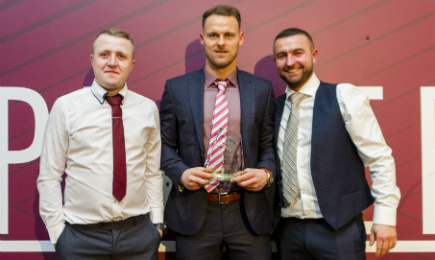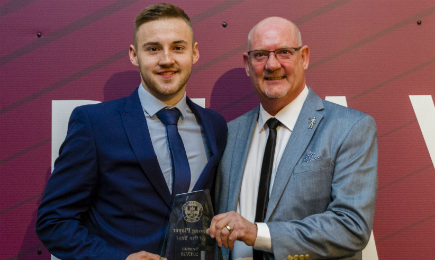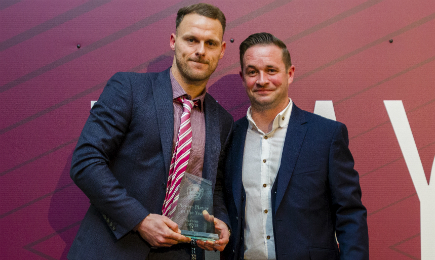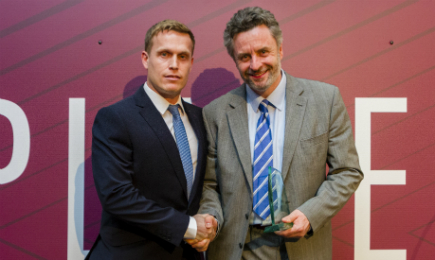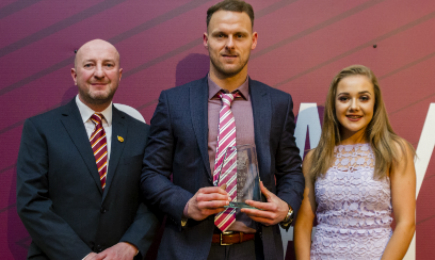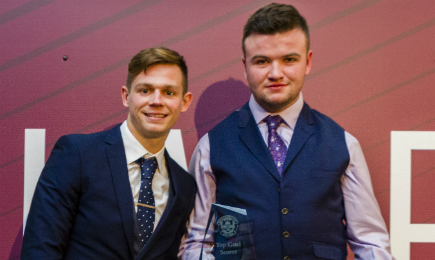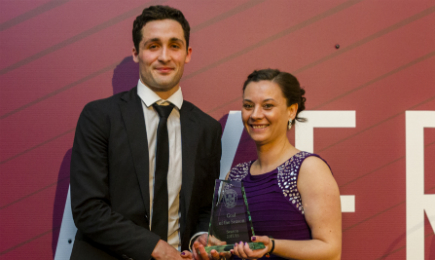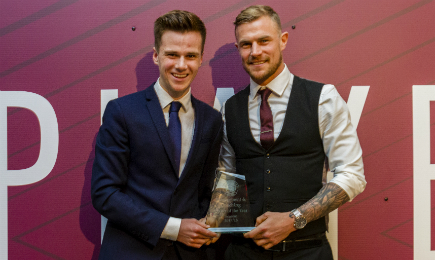I remember it as if it was yesterday. Saturday, 21st August 1968 was a lovely summer’s day in North Lanarkshire where most of the locals were excited at the prospect of rolling up to Fir Park to take in a league match for the first time in four months. It was also a very special day indeed for myself. I was seven years old, and my Motherwell supporting Dad had decided to help me avoid the “pitfalls” I was dangerously close to falling into, in my Glasgow community.
On the back of the Fir Park side being relegated, he saw it as the perfect opportunity to introduce me to this very special football club which seemed a million miles removed from the two which all my friends supported. It was also the day that Keith Alexander MacRae came into my life, and do you know what, he’s never really left it.
My dad sat me on the wee white wall that used to surround Fir Park, and for the first time I saw a Motherwell team run out one by one on to Fir Park, resplendent in their claret and amber kit.
As good as the players looked, it was the guy in an all green kit who came out second in line, with a shock of almost afro ginger hair that really caught my imagination.
MacRae, Whiteford, Wark, Donnelly, McCallum, Muir, Campbell, Forsyth, Deans, McInally and Wilson, a team etched in my memory. So awestruck was I, that the opponents could have been anybody. As it happens, it was Albion Rovers who would be steam rolled seven goals to nil.
The dream competitive debut for Keith was in stark contrast to his first appearance three weeks earlier. MacRae, who had only just signed on at Fir Park as a part timer, due to him also training to be a journalist with the Scottish Daily Express, was selected to play against Tranmere Rovers in a friendly.
Sadly, he was injured within a couple of minutes, to be replaced between the sticks by Joe Wark. Although “Josie” went on to keep a clean sheet in the 2-0 win, secured by two goals from youngster Jim “Jumbo” Muir, it was a less than auspicious start for the ‘keeper who would go on to be one of the brightest talents this club had ever seen.
Despite the unfortunate injury, Keith kept his place in the side for the first nine league and league cup ties which returned five wins and three defeats, all by a single goal. His tenth appearance for the club came in the penultimate league cup sectional tie up in Montrose, incredibly, as a left midfielder. Whatever manager Bobby Howitt was thinking, it worked to a degree. Keith MacRae prodded the ball home at the far stick to score his first goal in Motherwell colours, although it wasn’t enough to stop the “Gable Endies” winning 2-1 to end the Fir Parkers interest in the cup for another year.
Howitt tried the same trick again in Paisley a few days later with MacRae taking his position in the outfield, but again it only contributed to a defeat, as the Buddies ran out comfortable winners 2-0. After the Love Street loss, Keith picked up an injury that hampered him and he was nowhere to be seen either in the green goalkeeper kit or the amber outfield kit, his places taken by Peter McCloy and Jackie McInally respectively, until February.
When he did reappear, again on the left side of midfield, he did so with another goal in a four goal romp at home to Alloa, which was the club’s twentieth league victory in twenty three outings as Motherwell closed in on a record breaking championship win.
The following 1969/70 season saw Keith rather playing second fiddle to Peter McCloy who was nicknamed the “Girvan Lighthouse”, save a start and a substitute appearance, both at left midfield against Dundee United and Hearts respectively.
Of course this was the campaign which featured an epic league cup quarter final tie with Morton. Having been taken apart down at the tail o’ the bank to the tune of 3-0, the Steelmen were written off, but no one told the players as goals from Jumbo Muir, McInally and Tam Forsyth at Fir Park earned a replay at Ibrox.
Injuries would mean that Keith MacRae would play at right back as Motherwell edged a titanic struggle, with Muir firing home four minutes from time to earn a Hampden Park date with a cracking St. Johnstone team.
That occasion would be a disappointment to ‘Well, Keith, and a certain seven year old kid who witnessed his first, and certainly not last, semi final defeat.
Within a month, Keith had reclaimed his place between the sticks, with McCloy playing reserve team football. A few weeks later at New Year, I remember vividly sitting in our living room and watching the sports reporter blurt out the line I had grown to dread. “Rangers have concluded a transfer deal for Motherwell goalkeeper…” My heart sank, I was devastated… “Peter McCloy.” I cheered. My hero was staying at Fir Park.
MacRae’s first game as Motherwell’s undisputed number one came at home to Ayr United in a ‘Well side that contained the “makeweights” in the deal that took McCloy to Govan, Bobby Watson and Brian Heron. Both of these guys would soon be adored by the Fir Park faithful as they looked to rebuild their careers from the limited opportunities they got at Rangers. In that first game, they certainly got off to a flyer with the Steelmen securing a 3-0 win with a terrific display capped with goals from Deans, Heron and Wark, with MacRae celebrating his newfound status with a well-deserved clean sheet.
Another great cup-tie of that season saw Kilmarnock roll up Airbles Road in the Scottish Cup quarter finals. A crowd of almost 17,000 witnessed a breathtaking display from visiting ‘keeper Sandy McLaughlin to keep the Steelmen at bay, before Ross Mathie beat MacRae with a powerful header to send the Ayrshire side through to a Hampden semi.
By the end of the campaign, newly promoted Motherwell were safely tucked up in mid table as manager Howitt succeeded in his primary task of avoiding the drop. That close season was a difficult one for Keith as he underwent a bone graft operation on his wrist which had been giving him some discomfort. The club moved in that summer to get cover for MacRae, and signed ex-Rangers goalie Billy Ritchie from Partick Thistle.
Ritchie began the season with the gloves while Keith was still recovering from his injury, and played in all six league cup sectional games before MacRae made his first appearance as the league got under way, with a 4-1 hammering of Kilmarnock at Fir Park. It would be a successful season for the young keeper as he earned ten clean sheets, playing in all 34 league games. He also came, for the first time, to the attention of the big English clubs with his displays in the inaugural Texaco Cup in this season.
Motherwell were drawn against Stoke City in the first round, who had the world’s best goalkeeper in their side, Gordon Banks. A terrific display from Banks in the first leg kept his side in the tie with John Goldthorpe scoring the only goal in an enthralling match at Fir Park.
In the return at the Victoria Ground, it was Keith MacRae’s turn to impress the punters, as he produced an almost faultless display which afterwards drew admiration from the legendary Banks. The second leg finished 2-1 to Stoke City after extra time, which left us with a penalty shoot out to determine the winners. Keith MacRae emerged from the Potteries that night as a Motherwell hero, making two terrific saves to send the Steelmen through to meet Tottenham Hotspur in the quarters.
The Spurs side, packed with superstars, edged the first leg at White Hart Lane 3-2, leaving ‘Well hopeful for the return at Fir Park. The atmosphere that night was red hot as the Fir Park fans looked to help unsettle the big names from down south.
Martin Chivers and Brian Heron had exchanged goals in a first half that left the 22,500 fans inside the old ground breathless. The second half would be even better as MacRae pulled off a wonder save that some fans still talk about today, to deny Alan Gilzean. Minutes later, Fir Park erupted as goals from Bobby Watson and Tom Donnelly secured the 5-4 win on aggregate.
The semi final would prove to be a disappointment though when MacRae picked up an injury which kept him out of the second leg at Fir Park, and Hearts scrambled a last gasp winner to take the spot in the final and leave the ‘Well fans in the 25,000 crowd stunned.
Such was his performances over this period, Keith MacRae was deservedly called into the full Scotland squad for the end of season British Home International Championships as under study to Aberdeen’s Bobby Clark. Sadly for Keith, this would be as close as he’d ever get to gaining a full cap for his country, although he did represent the Scottish League.
Season 1971/72 started well again for Keith and his mates, with decent results over the first fourteen league games, and an international call up for Keith to the Scotland Under 23 setup. However, it all went a little pear shaped one afternoon at Firhill, which no-one saw coming.
MacRae picked up an injury early on and struggled throughout as the Jags ran eight goals by him. MacRae’s season was finished, bar three outings in February, which brought three clean sheets. It was an interesting season for Motherwell keepers, with no less than six occupants of our goals, McRae, Ritchie, a young Tommy Burns and experienced John Fallon all started games. Joe Wark and fellow outfield player, Davie Main had also taken over as ‘keeper following injuries during matches.
MacRae started the following season again on the treatment table, as Billy Ritchie took over the goalkeeping duties. It was mid-September before Keith was ready, making his return in a 2-2 draw at Muirton Park against St. Johnstone.
Another nine clean sheets from MacRae helped the Steelmen improve their league position again in a season where Bobby Howitt had resigned following some disaffection from the Fir Park terraces. The eighth place finish was the best the club had achieved since the hey days of the Ancell Babes.
By the time the new season began, several teams in England were showing a marked interest in MacRae, which heightened with nine clean sheets in the first seventeen games. In retrospect it was an epic League Cup quarter final tie against Celtic which proved irresistible to the sky blue half of Manchester. Keith MacRae turned in three performances like a Motherwell ‘keeper has rarely produced, as the Steelmen went toe to toe with the Glasgow giants.
The first leg at Fir Park saw Celtic win 2-1, with John Goldthorpe inches away from earning a draw with a pile driver that crashed off the underside of the bar, before bouncing clear late on.
The second leg would be a historic one for Motherwell, as we won at Celtic park for the first time in twenty three years, the first win of any kind over the Hoops in fourteen attempts. Goldthorpe again was the hero for the Steelmen, picking up the ball in his own half before powering a fantastic drive into the net to put the visitors one up.
Midway through the second half, Keith MacRae produced a simply stunning save from a George Connolly penalty which secured a replay for Motherwell. MacRae only played one more game for the Steelmen, a 2-1 home defeat to Partick Thistle, before Manchester City arrived at Fir Park with a cheque for £100,000.
It was too good an offer to turn down and Keith headed to Maine Road, finally clutching a full time contract with the blessing of everyone at the club, leaving manager Ian St. John to turn to Falkirk reserve ‘keeper, Stuart Rennie, to fill the huge gap left in the Motherwell rearguard. Motherwell lost the next game against Ayr United, with a certain Alex Ferguson heading the winner.
Keith MacRae was one of the most remarkable players ever to play for this club, with his ability to play every position on the field. He is without doubt the most agile and athletic ‘keeper I’ve ever seen at Fir Park, which he probably had to be given that he wasn’t the tallest of custodians.
He exuded a confidence in dominating his penalty box, collecting crosses with consummate ease before often sparking a counter attack, the first goalie I ever saw do this.
But it is probably his shot stopping, which at times bordered on the truly ridiculous, allied with his iconic all black kit which I recall most vividly. In the end, Keith may only have turned out 119 times for the Steelmen, scoring twice, but to fans of a certain age he remains an absolute legend of this club.
Had I not taken such a shine to him that afternoon almost fifty years ago, I might have been writing for an Old Firm audience instead, and that just wouldn’t have felt right.
Eddie Ferguson













